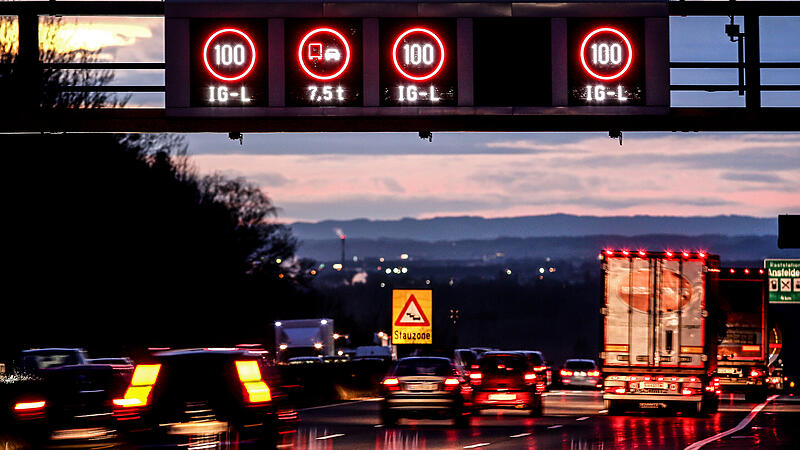Image: VOLKER WEIHBOLD
A team of 55 researchers from the Climate Change Center Austria (CCCA) evaluated the submitted measures. “They offer a good basis for closing the gap in emissions reduction,” summarized Graz climate researcher Karl Steininger at a media event in Vienna on Wednesday.
- New OÖN series: We are changing: Together for a good climate in Upper Austria
“A wide range of highly recommended further measures are now on the table,” says Steininger, who researches at the Wegener Center for Climate and Global Change at the University of Graz: “By implementing a sufficiently large proportion of these, Austria can clearly achieve its climate goals.”
Some measures at a glance:
- Speed reduction to 100 km/h (motorway), 80 km/h (open road) and 30 km/h (urban area)
- Expansion of electricity generation through solar and wind energy
- Decarbonization of district heating
- Expand organic farming
- Making nutrition more sustainable
Speed reduction “highly effective”
Among the measures there is about one Speed reduction on Austria’s roads at 100, 80 and 30 kilometers per hour on motorways, open roads and in local areas, which the scientists classified as highly effective. This would not only enable a formidable reduction in greenhouse gas emissions from transport, but there would also be 28 percent fewer road deaths, according to the forecast.
- Also read: 100 km/h on motorways: “Sensible” or “chicane”?
An increased expansion of the Electricity generation through solar and wind energy would also be very effective, like one Decarbonization of district heating, reported Keywan Riahi from the International Institute for Applied Systems Analysis – IIASA in Laxenburg (Lower Austria). When incinerating waste, the resulting CO2 should be “captured” and stored, heat pumps should be installed more often in buildings and heating, ventilation and air conditioning systems should increasingly be supplied with renewable energy. In construction, emissions could be reduced by recovering materials at a higher rate, i.e. recycling them.
There are also many approaches that are classified as effective in agriculture, forestry and nutrition, said the Austrian meteorologist and climate researcher Helga Kromp-Kolb: You should Expand organic farmingreduce food waste and yourself eat more sustainablyby consuming more plant-based products and fewer animal products.
“Strong resistance to speed reduction”
However, some of the proposed measures, such as reducing the speed of road traffic, are not very popular with the population, explained Benjamin Schemel from the Institute for Ecological Economics at the Vienna University of Economics and Business (WU). According to a representative survey by the opinion research institute “Gallup”, there is a “very strong resistance” to speed reductions in road traffic, as well as to an end to new registrations of combustion engines.
This vote is disabled
Please activate the category Targeting cookies in your cookie settings to display this item. My cookie settings
However, the majority would welcome an expansion of public transport and cycle paths. There are also many supporters of moving away from fossil fuels and expanding the power grid infrastructure and renewable energies.
“Solid basis for climate plan”
In press releases, non-governmental organizations (NGOs) welcomed the scientific evaluation of the concepts presented. “They clearly show which priority measures we can use to achieve our goal and have thus created a solid basis for the further development of the National Energy and Climate Plan,” says Johannes Wahlmüller from Global 2000. “The party-political hiccups around the plan should be avoided “Finish draft” and present an effective plan, he says.
“The CCCA assessment lays the foundation for a science-based climate policy, which also corresponds to the Paris Climate Agreement,” explained Karl Schellmann from WWF Austria. In order to close the gap in the reduction targets in the climate plan, the federal government must at least supplement the final version with the currently proposed scientific measures.
“Detailed guidance for the government”
“With today’s assessment, the Austrian government has detailed instructions on which climate protection measures it can best use to achieve the EU climate goals,” says Jasmin Duregger from Greenpeace: “The only right thing to do now is to listen to the science “to anchor the necessary measures in the climate protection plan and send them to Brussels as quickly as possible.”
- From the archive: Climate plan: EU opens proceedings against Austria
The National Energy and Climate Plan (NEKP) is binding for all states in the European Union (EU). In it they must explain how they want to achieve the EU energy and climate goals. It must be completed and submitted to the EU Commission by June 2024. According to calculations by the Federal Environment Agency, the measures currently proposed will not achieve the EU targets. Instead of 48 percent less greenhouse gas emissions by 2030 compared to 2005, only 35 percent would be achieved. That’s why a “public consultation” was launched in the summer. Political parties, interest groups, ministries, federal states, scientists and NGOs were invited to submit their ideas on how the specified reduction could be achieved. The draft was presented to them at the beginning of July 2023 and they had until the end of August to comment on it in writing.
1,408 possible measures
A team of 55 scientists from the CCCA evaluated the proposed measures in this report. They were proposed by 100 institutions “from A for Office of the Burgenland State Government to W for Austrian Chamber of Commerce,” it says. They provided 1,408 possible measures from a wide range of areas, such as transport, energy and industry, buildings, agriculture and forestry as well as waste and recycling management.
- The measures and evaluations in detail
However, there is currently no agreement on the government side regarding the NEKP. Last Sunday, Climate Minister Leonore Gewessler (Greens) again called on Constitutional Minister Karoline Edtstadler (ÖVP) to give in in the “ZiB2” interview. Speaking to the media on Monday, Edtstadler maintained her criticism that Gewessler had sent the NEKP to Brussels without discussing this with his government partner. The EU Commission opened infringement proceedings against Austria in December. The reason is the failure to send the draft to Brussels on time, according to a list of procedures from the EU Commission. The draft submitted by the Climate Protection Minister in October was withdrawn by Edtstadler.
My themes
For your saved topics were
new articles found.

info By clicking on the icon you can add the keyword to your topics.
info
By clicking on the icon you open your “my topics” page. They have of 15 keywords saved and would have to remove keywords.
info By clicking on the icon you can remove the keyword from your topics.
Add the topic to your topics.
Source: Nachrichten




